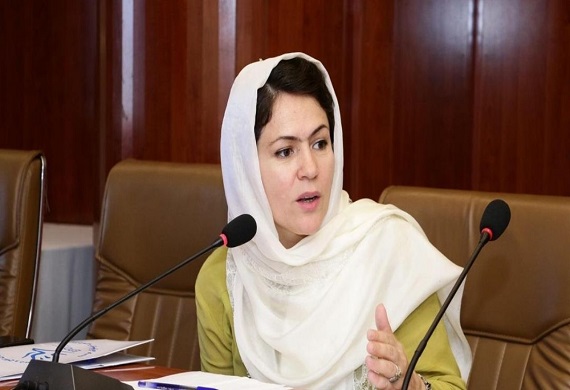
Fawzia Koofi visit UN as woman in exile after the two months of Taliban seized control in Afghanistan
By: WE Staff | Monday, 25 October 2021
Two months after the Taliban seized control in Afghanistan, one of the country's once-powerful female leaders — a former parliamentarian, presidential candidate, and Nobel Peace Prize nominee, Fawzia Koofi— is visiting the UN as a woman in exile, not as a representative of her government.
Fawzia Koofi demanded that humanitarian aid be contingent on women's participation in its delivery, as well as free and safe travel for Afghans entering and exiting the country.
Koofi said, “Aid should not be politicized. ... Women should be involved in every stage of it and they should be listened to. Women should not be only the recipients”. She is part of an Afghan women's delegation visiting the United Nations to urge member nations not to compromise on inclusion and equal rights in Afghanistan.
Koofi has been staying in hotel rooms in Europe since escaping from Kabul in August. She highlighted the anguish of being separated from her homeland, of having two decades' worth of expectations destroyed, and of trying to find a permanent home for herself and her two daughters.
“This is not an Afghanistan I fought for. The Afghanistan that I was hoping for was (that) women should not suffer as much as I suffered during my childhood, during the time that I was a teenager, when (the) Taliban took over”, added Koofi.
she said, “I wanted other girls to enjoy at least the freedom of choosing which school they should go. But now, their choice is limited to which room in their houses they should spend during the day. This is heartbreaking”.
Koofi, a former deputy speaker of parliament, was one of only four women involved in abortive talks with the Taliban to establish a power-sharing agreement. She highlighted how, after signing a peace accord with the US in February 2020, the Taliban's commitment to negotiations shifted.
She claims that her former female colleagues in parliament, female judges who used to sentence Taliban supporters and certain journalists who spoke out against the group are now afraid.
She added that the Taliban must be held accountable for their promises that women will be permitted to attend school and work “within the principles of Islam”.
Every day, Koofi says she receives hundreds of text and voice messages, mostly from Afghan women who hope she can assist them.
Koofi said, “They’re very angry ... that I am not with them at these difficult times. The women, especially, they keep sending me messages expressing their anger that, you know. We need you to be here with us in the streets of Kabul, and they are right".
Most Viewed
- 1 Women's Health Startup HerMD Closing Doors Amid Industry Challenges
- 2 5 Famous Women in Indian Armed Forces
- 3 Saudi Women No longer Require Male Permission for Clothing Choices, says Prince MbS
- 4 Kolkata Medtech Startup Innovodigm Raises Rs 5.5 Crore Seed Funding Led by IAN Group
- 5 Yamunanagar's Kashish Kalra Honoured after Securing 111th Rank in UPSC Civil Services Exam
- 6 Madurai Appoints Its First Woman Corporation Head
- 7 IAS Vijayalakshmi Bidari Appointed as the new Nagpur Divisional Commissioner
- 8 American Entrepreneur Lucy Guo Overtakes T Swift to become Youngest Female Billionaire
- 9 ICC Women's World Cup 2025 Trophy Showcased at Indore's Holkar Stadium
- 10 Aparna Saxena's Beauty Venture AntiNorm Launches in India
- 11 Vidya Nataraj Co-Founded BlueStone Jewellery & Lifestyle files IPO
- 12 5 Women Freedom Fighters of India
- 13 Dr. G Krishnapriya appointed as CEO for Trichy
- 14 M3M & Sirona Partner to Introduce Menstrual Hygiene Vending Machines in 15 Locations
- 15 Punjab Govt launches SHE Cohort 3.0 Supporting Tech-led Women Startups
- 16 Indian origin Lawyer, Sweena Pannu appointed as the US New Superior Court Judge
- 17 The Aurora Tech Award recognizes 4 Indian Women-led Startups
- 18 Kerala's Republic Day parade featured an all-female tableau
- 19 Manisha Kabbur Becomes Karnataka's First Woman International Karate Coach
- 20 Director K. S. Ravikumar's Daughter Maalica Ravikumar Launches Life Coaching Company 'Evergrowth Academy' for Women
- 21 Leezu's Raises Pre-Seed Funding to Accelerate Growth in Sexual Wellness Industry
- 22 Sattu: Super-easy summer drink for PCOS gut healing
- 23 Swathi Nelabhatla creates Sitha App, India's First Women-Exclusive Gig Platform
- 24 7 Timeless Female Kathak Dancers & their Iconic Legacies
- 25 Meet 7 Iconic Women Architects of Modern India & their Most Impactful Work
- 26 This Woman-led Insuretech Startup is Helping Bridge the Education Financing Gap in India
- 27 Women Leaders Share Lessons Learnt from India Women's WC Win
- 28 5 Enterprising Women Founders Powering Singapore's Tech & Innovation Landscape
- 29 4 Women. 4 Stories. One Vision for Smarter, Stronger Healthcare
- 30 Global Gender Gap Narrows to 68.8%, But Full Equality 123 Years Away: WEF Report 2025
- 31 Changemakers: 7 Women Entrepreneurs Taking the Make in India Movement Forward
- 32 Meet Lucy Guo, The Youngest Self-Made Female Billionaire Disrupting Tech
- 33 How Women are Driving India's Festive Online Shopping Surge






